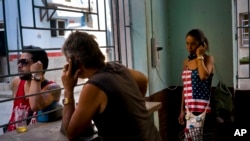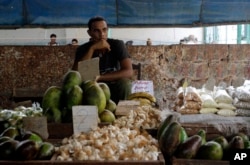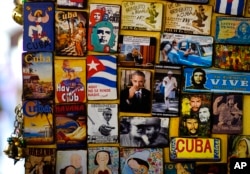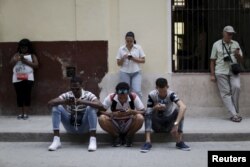Cuba has a cash economy.
When U.S. attorney and Cuba expert Robert Muse visited a few weeks ago, he did not see one ATM machine or any bills being paid with credit cards. He saw only cash transactions.
Muse thinks that's about to change. The D.C.-based international trade and foreign direct investment specialist told VOA that rule changes announced by President Barack Obama earlier this week will open the door.
"Obama has his foot on the accelerator. He's going straight ahead with Cuban normalization and he's going to keep going until the end of his presidency," said Muse. "This will be Obama's legacy, like [former President Richard] Nixon with China."
The rule changes allow Cuba to use U.S. dollars when trading with a third party.
For example, if Cuba were to buy wheat from Argentina, it could pay for it in dollars. The new rules also eliminate a ban on Cuban access to the international banking system by allowing Cuban U-turn transactions, transactions that are routed through U.S. banks on their way to other countries.
Credit card race
While American banks are not unilaterally allowed into Cuba yet, credit card companies are all striving to set up business there so that tourists can use their cards and Cubans may have access to credit cards, as well.
MasterCard currently is working through a third party that has access to Cuban banking, says Mateo Lleras, MasterCard vice president in the Latin American and Caribbean division.
"In November 2015," Lleras said, "we joined with Stonegate Bank [a bank headquartered in Florida] to introduce the first U.S.issued Debit MasterCard that can be used at any of Cuba's 10,000 hotels, restaurants and other card-accepting merchants."
MasterCard removed its network block on U.S.-issued cards being used in Cuba in March 2015. Lleras explained that "since then, federal rules left the final decision to each [American] bank whether its cardholders will be allowed to use their cards on the island."
Both Visa and American Express also lifted blocks on U.S.-issued credit and debit cards. Visa advises its cardholders who plan on Cuba travel, to first contact the bank that issued the card to confirm if it can be used in Cuba.
Stonegate banker Guy Gifford said Stonegate's MasterCard is "only for signature-based transactions in Cuba," meaning it can only be used as a debit card, linked to the user's checking account. Gifford said the arrangement does not allow for the card holder to take out cash.
Gifford said there have been a lot of requests for the card, and the bank is hoping for money transfer approvals, allowing for increased usage. No ATM's would be involved.
Stonegate has the first U.S. correspondent-banking deal with a Cuban bank, BICSA, in a half-century. It is literally Cuba's banker in the United States.
Cuban reluctance
In January 2015, the American government authorized four major areas of businesses that American companies can try to develop in Cuba: telecommunications, construction, agriculture and medicine.
There's been a dilemma, however, according to Jose Fernandez, co-chair of the Latin American Practice Group at the global law firm, Gibson Dunn.
"What you can't do is invest with the Cuban government, together with the Cuban government company. Why? Because the U.S. doesn't want to be supporting the Cuban government. But, at the same time, though, most of the businesses in Cuba are owned by the government," he said.
On the other hand, "it takes two people to salsa," said Fernandez, who is Cuban-American himself, adding that the Cubans aren't fully ready to dance.
When it comes to the four permitted businesses, Fernandez said, "The Cuban government hasn't exactly been terribly welcoming of American investment."
As an example, he cited the fact that "Cuba has some of the lowest Internet penetration rates in the world, almost Bangladeshian in numbers. The Cubans haven't allowed or given permission for a lot of the American telecom companies and American Internet companies to go into Cuba."
"Google executives were in Cuba and said that they would be willing, free, gratis, to hook up the Cuban population to the Internet," Muse said. "They got a scolding from the senior VP of Cuba who said We do not want the Americans coming and interfering in our sovereignty in that way.' "
One U.S.-based international service provider, IDT Corporation of Newark, New Jersey, has had a deal with Cuba's state-owned telecom provider, ETECSA, to provide a direct telephone interconnect to provide long distance service between Cuba and the United States.
Bill Ulrey of IDT said the company has had a significant increase in minutes and voice quality improvement since operations with ETECSA began in March, 2015. IDT did not build any infrastructure.
The IDT/ETECSA deal is unusual as yet.
"You are seeing greater interest on the part of U.S. companies, but we have yet to see the reciprocal interest on the part of the Cubans," Fernandez said. "And, I think that's maybe part of the reason why President Obama is going to Cuba to see exactly what kinds of reciprocal moves the Cubans will make."
Fernandez believes the Cuban government was not ready for President Obama's initiative.
"Right now," he said, "I would argue that the Cuban government, the Cubans, were taken by surprise by the Obama administration. For 50 years, the U.S. had been saying, 'We'll do X, if you'll do Y.'
"What President Obama did, he said, 'No, we're going to do X because it is good for the U.S.' I think once you see them [the Cuban government] authorizing U.S. companies, then you will know that they have a policy in place, they have decided how they are going to address something that they were not expecting – that is American investment," Fernandez said.
American caution
So far, not many U.S. companies have announced an immediate investment in Cuba.
According to Fernandez, "some of that is because the changes that were made by the Obama administration are by executive order and a new president could change that executive order, and could decide again that U.S. investment in Cuba is prohibited."
That means any investment could be at risk, but John Drew, professor of communications at New York's Adelphi University, says it is time to make the changes permanent. Drew had just returned after taking a group of students to Cuba for a two-week educational experience.
He said the trade embargo is a policy the U.S. can do away with.
"We're not accomplishing the things that we intended to accomplish with it anymore," Drew said. "And some would argue we never did. Some would argue we actually reinforced some of the things we tried to keep out."








